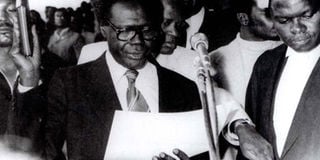Obote was not a corrupt leader

Apollo Milton Obote
I refer to the story titled, ‘Obote, ministers live extravagantly as economy weakens’, in the Sunday Monitor of July 8 in which the writer purportedly tells Uganda’s history regarding the Obote II administration. In the story, the author, without any evidence, makes outrageous statements such as ‘president Obote and his UPC cronies enjoyed a lavish life, plundered the economy, etc, with cartoon illustrations of Obote and his ministers merry making, carrying briefcases of cash to five star hotels and boarding planes to go for medical treatment abroad just to emphasise his obnoxious statements. In short, he portrays the Obote II administration as a cold blooded, self-serving, corrupt and anti-people regime.
As a concerned citizen, I feel duty-bound to respond to this mischievous distortion of history. Obote, like any other political leader, may have committed many political blunders some of which proved costly to both him and the country. However, financial impropriety, including plunder and extravagant life at the expense of the taxpayers, was not one of them.
It is on record that following the Idi Amin coup that ousted him in 1971, the UK government dispatched a Scotland Yard team to Kampala to investigate Obote for evidence of financial corruption in order to justify their support for the coup and embarrass president Julius Nyerere, who had granted political asylum to Obote. After months of checking every relevant record, the team found no evidence and left in ignominy.
Obote’s second coming was greeted with excitement and apprehension in equal measure for quite understandable reasons. Interestingly, one of the reasons for apprehension, was his uncompromising stand against corruption.
In May 1980, I was in the Academic Registrar’s office at Makerere University to check on the admissions for which I was a candidate when a female junior officer exclaimed to her colleagues in the office “banange akasajja kakomyewo mpulira tekagala enguzi, mwerinde” meaning “my colleagues, I have heard the man has come back and I understand he does not tolerate corruption, be careful”. Indeed throughout the five-year rule of Obote II, everything at Makerere University as was with other public institutions, improved, including transparency in its admissions. For example, recruitment of graduates into the public service was an annual event conducted by the Public Service Commission (PSC) at university immediately after examinations, something which ceased in 1986.
Allegations of corruption against some of his ministers and other officials existed, but there was nothing to suggest that he personally condoned or colluded in such corruption. A former NRA fighter, who visited Obote while in exile in Zambia after his second ouster, found him wallowing in abject poverty.
Obote’s personal physicians were well known and were Ugandans working in Mulago Hospital so it is not true he received medical treatment abroad.
Samwiri Wakhakha,
[email protected]




